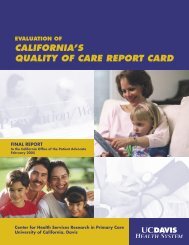HMO Guide for Seniors - Office of the Patient Advocate - State of ...
HMO Guide for Seniors - Office of the Patient Advocate - State of ...
HMO Guide for Seniors - Office of the Patient Advocate - State of ...
Create successful ePaper yourself
Turn your PDF publications into a flip-book with our unique Google optimized e-Paper software.
18 When You Retire<br />
W<br />
hen you retire, your health coverage usually changes. If<br />
you have retirement health benefits, follow your employer’s<br />
or union’s rules carefully so that you do not lose your benefits.<br />
Enroll in Medicare Part B<br />
Usually, you should sign up <strong>for</strong> Medicare Part B when you<br />
retire, even if you have retirement health coverage. You have 8<br />
months to sign up, starting with <strong>the</strong> month your employment<br />
ends. If you wait, you may have to pay higher premiums.<br />
Buy Medicare Part D if you don’t have “creditable” drug<br />
coverage. Creditable coverage is coverage that is as good as<br />
Medicare Part D or better. If you have drug coverage as a retiree,<br />
your plan should tell you in writing if <strong>the</strong> coverage is creditable.<br />
Ron retired at 66.<br />
“When I was<br />
ready to retire,<br />
I called Social<br />
Security and<br />
enrolled in<br />
Medicare Part B.”<br />
If your drug coverage is creditable, you should keep it. If you<br />
buy separate Part D drug coverage, you might lose all your<br />
retiree health benefits.<br />
If you do not have any drug coverage or your drug coverage<br />
is not creditable, you should get Part D coverage. You should<br />
buy it within 2 months after your employee health coverage<br />
ends. If you wait, you may have to pay higher premiums.<br />
© Dennis Wise/GettyImages









